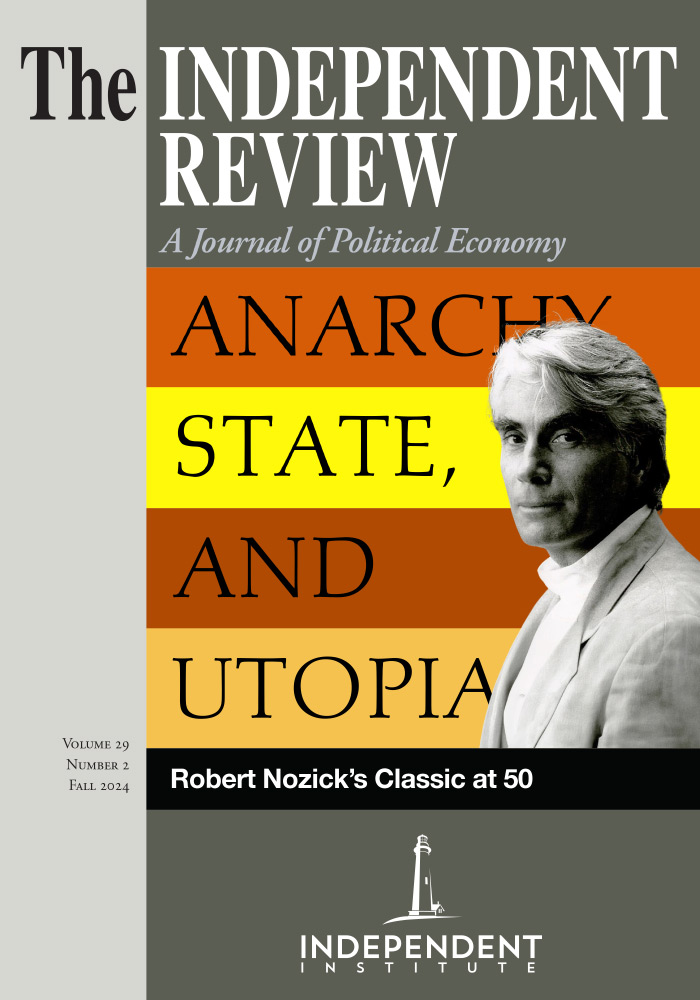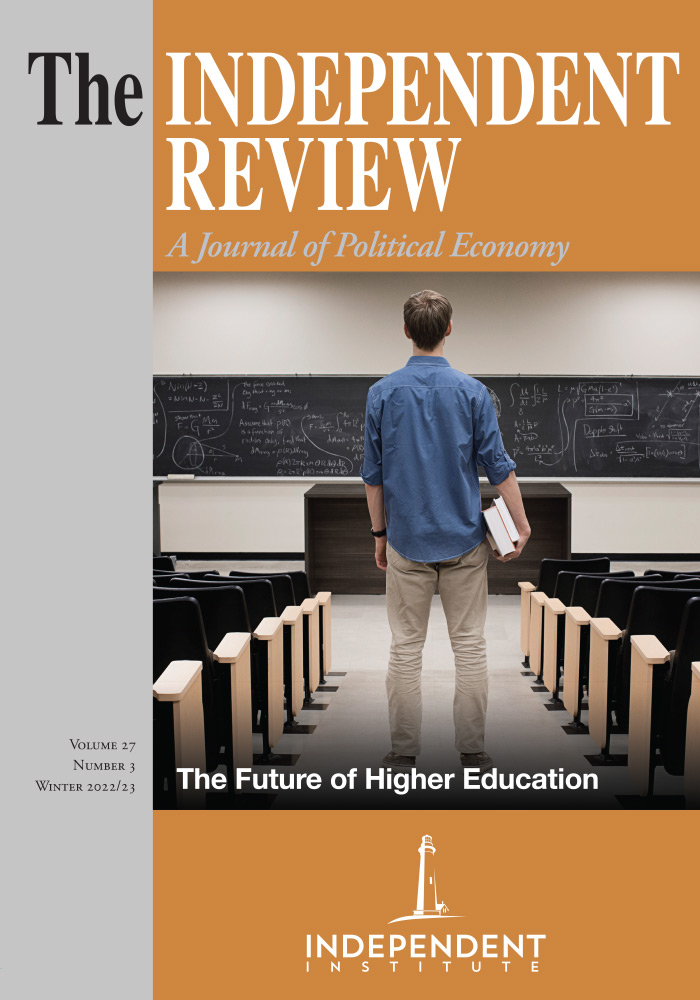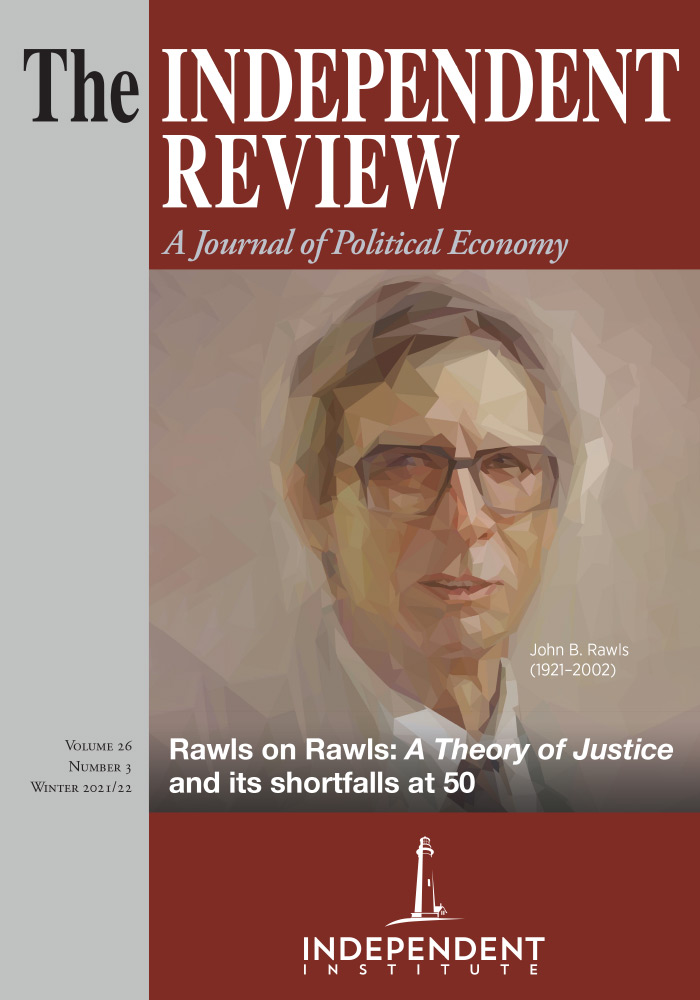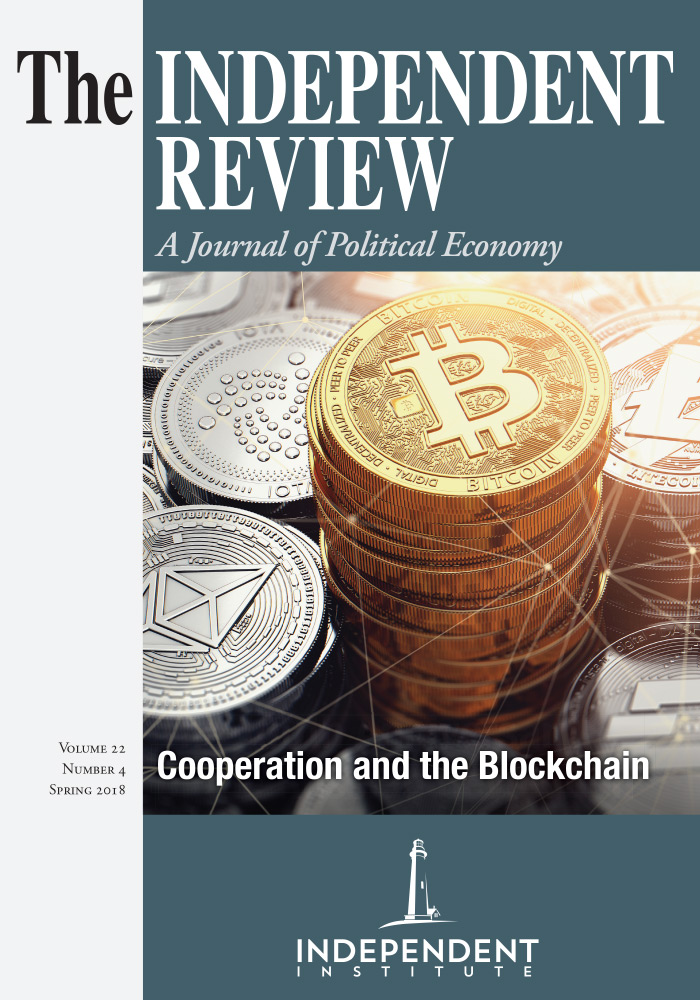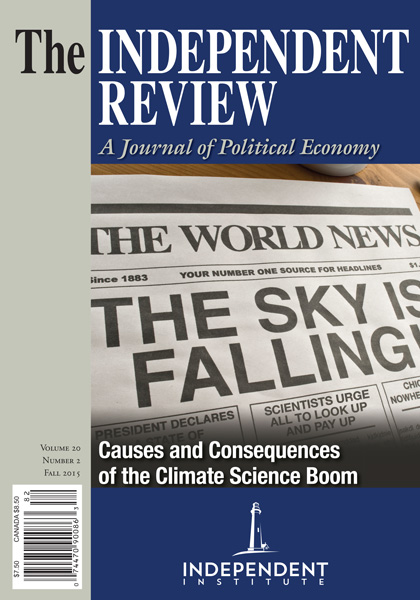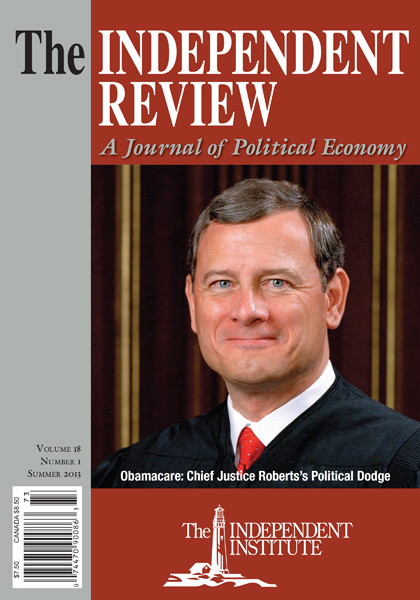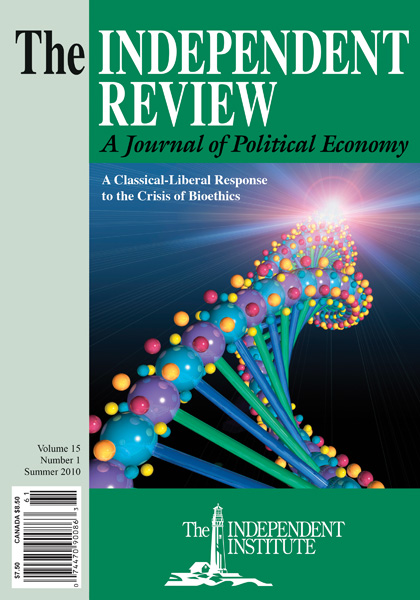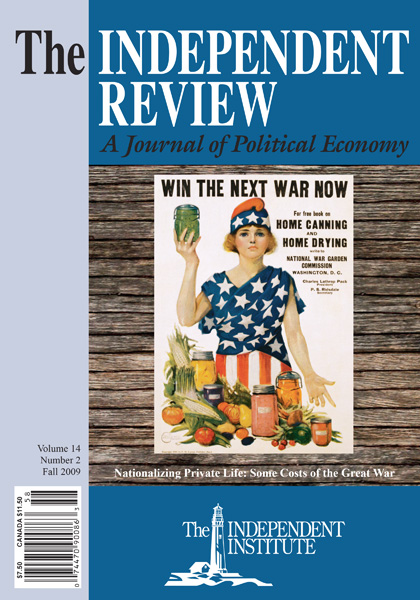This paper tied for first place in The Independent Review’s 2024 Student Essay Contest.
Milton Friedman’s argument that the social responsibility of a business is to increase its profits is too narrow, as he doesn’t specify the end of profit. Thomas Aquinas warns that though management may act rationally in undertaking profit-creating projects as a duty to shareholders, it is the owners’ desire of wealth for wealth’s sake that is irrational since they attempt to satiate that which is insatiable. A full picture of what business should be must grapple with the ultimate purpose of being.
Article
In 1970, the New York Times published an article titled “The Social Responsibility of Business Is to Increase Its Profits,” written by the American economist and future Nobel laureate Milton Friedman. Friedman wrote to an audience of corporate executives, who believe that business should not only pursue profits but also promote desirable social ends (Friedman 1970). He unequivocally rejects the trend of the “social responsibility of business” and introduces the idea of shareholder value theory, which has come to be known as the Friedman doctrine. Quoting his earlier book Capitalism and Freedom, Friedman states, “There is one and only one social responsibility of business—to use its resources and engage in activities designed to increase its profits so long as it ... engages in open and free competition without deception or fraud” (1970, para. 33). This idea has been significantly influential on corporations since, and in neoclassical economics, it is adjacent to the principle of profit maximization.
Friedman’s perspective has been the object of much criticism and debate in dialogue about business ethics. To put it into perspective, his landmark article has been cited over twenty thousand times (Edmans 2020). Critics often point to the 2008 financial crisis as the consequence of firms aggressively pursuing the goal of profit maximization such that it leads to financial destabilization (Hirschfeld 2018). Supporters attribute the mass alleviation of those living in extreme poverty to the fruits of shareholder value maximization (Kaplan 2020). Moreover, the growing importance of corporate social responsibility to engage in environmental, social, and governance practices makes it ever more important to firmly establish the true purpose of business and to critically engage with Friedman’s arguments.
Friedman and Saint Thomas in Conversation
It is amid this clash of normative arguments over the Friedman doctrine that the enduring wisdom of the thirteenth-century Italian Dominican theologian Saint Thomas Aquinas can be quite applicable and salient. Saint Thomas is most notable for his masterpiece, Summa Theologiae (henceforth ST), a classical systematization of Latin theology, and his synthesizing of Aristotelian metaphysics with Catholic theology (Chenu 2024). Thomas’s explanations and developments have come to be known as Thomism, and Thomas himself is “recognized by the Roman Catholic Church as its foremost Western philosopher and theologian” (Chenu 2024, para. 1)
Though Thomas never lived to witness the modern economy that Friedman examined, he still understood the “instrumental character of economic production” (Hirschfeld 2018, 135), that is to say, the reality that man labors in order to provide for himself. Thomas emphasized that humans have a responsibility to provide first and foremost for themselves but also have an obligation of provision for others. Moreover, his arguments are all based on the understanding that man is the “master of his actions through his reason and will” (ST I-II-1.1), whence free will arises, and that human actions are rational insofar as they tend to an end, directing and leading themselves to this end, or purpose (ST I-II-1.2). For it is Thomas’s understanding of the social function of economic production and the purposive nature of human actions that makes him a prime point of reference for Friedman’s argument about the social responsibility of business. This essay will evaluate Friedman’s “The Social Responsibility of Business Is to Increase Its Profits” through a Thomistic lens. It will ultimately argue that the principle of profit maximization lacks the full understanding of the purpose of wealth and business such that a market ordered under this framework is not ordered to human happiness.
Responsibility and Private Property
Friedman’s first argument is one concerning the principal-agency problem as it relates to social responsibility. To preface, Friedman’s argument addresses corporations, which are businesses structured with managers separate from shareholders, who elect these corporate executives. He identifies for whom the social responsibility for business might be. Friedman states that the corporate executives, as employees of the owners, are to “conduct the business in accordance with their desires, which generally will be to make as much money as possible while conforming to their basic rules of the society, both those embodied in law and those embodied in ethical custom” (1970, para. 4). From this, the proper order of the principal-agent relationship is that the agent, namely the manager, derives his duties and responsibilities from the interests of his principal, namely the shareholders.
Friedman offers two situations that involve the principal-agent relationship and social responsibility. First, he describes the manager whose responsibilities outside his profession, to his church, family, and country, for instance, compel him to leave his work to pursue them to a higher degree. However, he does not exercise social responsibility as an agent but as a principal since he spends his own money, not that of the owners. For this reason, he is completely justified in how he allocates his time, talents, and resources. Conversely, Friedman describes the manager who exercises social responsibility in his capacity as a manager. This would entail a manager who undertakes actions that would decrease or prevent corporate profits from being captured. To this, Friedman states, “Insofar as his actions in accord with his ‘social responsibility’ reduce returns to stockholders, he is spending their money” (para. 9).
The underlying principle of Friedman’s argument is one of private property, which supposes a certain autonomy over that which he owns. There are significant similarities between Thomas’s view of private property and Friedman’s view, which appears to be largely informed by classical liberalism, namely Adam Smith’s philosophy. Thomas states, “Man has natural dominion over external things, because, by his reason and will, he is able to use for his own profit, as they were made on his account” (II-II-66.1). From this, the principal-agent relationship proposed by Friedman seemingly stands firm. Since the agent is contractually obligated to the principal, he ought to act in alignment with the principal’s interests. Moreover, the principal is right to expect returns on his investments if he orders the agent to make it so. And he is reasonably displeased when his private property is usurped, or as Friedman describes, taxed and allocated by someone else’s schedule of values. Furthermore, it would be irrational for a corporation ordered to a specific business to undertake actions that are completely irrelevant, perhaps contradictory, to its particular business.
Thomas would, however, scrutinize Friedman’s claim that an owner’s desire is to “make as much money as possible while conforming to their basic rules of the society, both those embodied in law and those embodied in ethical custom” (para. 4), as that illuminates the teleological pitfalls of the profit-maximization principle, which will be addressed later in this essay. Moreover, there are minimal provisions for what constitutes ethical business behavior, as “conforming to their basic rules of the society” (para. 4) is strikingly vague. Additionally, there is a tension between rules rooted in law and those in ethical custom since the former is objective and the latter relative. What are some of these basic rules of society expressed through ethical custom? The answer is difficult to produce.
The major departure between Friedman and Saint Thomas occurs when one considers the fruits of one’s private property. Thomas defends one’s power to procure and dispense exterior things as it is lawful for man to possess property, but he qualifies this with a stipulation about their use (ST II-II-66.2). He states, “On this respect man ought to possess things, not as his own, but as common, so that, to wit, he is ready to communicate them to others in their need” (ST II-II-66.2). This comes as a critique of Friedman’s previous assumption that shareholders generally desire to generate as much money as possible. Thomas would argue that these owners have more responsibility in their private property than merely maximizing it for themselves. “Private property exists as a means of provision for ourselves, but our claim to a given piece of property does not confer on us the right to use the fruits of that property in any way we like” (Hirshfeld 2018, 168). Thomas argues that private property is to be possessed by an individual, but the fruits of it are to be shared with others in common. Friedman accepts the different responsibilities that a manager could undertake outside his corporate role, for instance, obligations to his church, family, and country, and it is reasonable to deduce the same would hold for an owner. However, in either case, the fruits of private property are shared with others as an afterthought, something secondary. Friedman states, “He may feel impelled by these responsibilities to devote part of his income to causes he regards as worthy” (para. 7). Friedman implies that these social responsibilities may be funded, rather than should be funded, and that they ought to be undertaken outside one’s work. From this, Friedman seems to regard a right to private property, so long as one does not violate the law, as absolute, for another’s stake in one’s fruits of private property exists insofar as one permits. Whereas Friedman sees private property as a useful mechanism for wealth creation, Thomas “sees the value of private property as a way of helping [individuals] to order [their] behavior in a way that is fitting with human nature” (Hirschfeld 2018, 169). Overall, Thomas raises the bar for responsibility such that sharing the fruits of private property is a primary responsibility and that others do have a stake in one’s fruits regardless.
Friedman does account for the situation where an owner may use his private property to create a corporation with an eleemosynary purpose, that is, a charitable one. In this situation, it would seem like the fruits of one’s private property are shared with others as in common. Friedman states that the “manager of such a corporation will not have money profit as his objectives but the rendering of certain services” (para. 4). However, it is problematic that the proper ordering of private property, that is, for the benefit of others, is possible only for nonprofit corporations, whose objective is to render a service. Can for-profit corporations accommodate the proper use of private property? The solution lies in the reordering of a for-profit corporation’s purpose away from the profit-maximization principle.
Profits for What, Exactly?
To begin understanding why profits cannot be sought for their sake, one must understand the nature of wealth. Thomas distinguishes between two types of wealth. “Natural wealth is that which serves man as a remedy for his natural wants: such as food, drink, clothing, cars, dwellings, and such like” (ST I-II-2.1). Natural wealth is fundamentally an instrumental good ordered to support the necessities of life; there is a satiable quality to this as there is a limit to how much one can consume in food and drink and make use of in shelter and clothing. Thomas continues, “Artificial wealth is that which is not a direct help to nature, as money, but is invented by the art of man, for the convenience of exchange, and as a measure of things salable” (ST I-II-2.1). Artificial wealth is likewise a fundamentally instrumental good, but it is ordered to procuring natural wealth, that is to say, artificial wealth is an instrument to the instrument of natural wealth. The principle of profit maximization orients the purpose of business to “use its resources in activities designed to increase its profits” (Friedman, para. 33). The translation into the Thomistic framework is that the purpose of business is to order economic activities toward the end of money for its own sake. However, this inverts the proper order of wealth in that economic activity is ordered toward an end, namely, money, that fundamentally can only be a means. The problem with this disordered relationship is twofold.
The first issue is one of insatiability. “The desire for an end is always infinite, since it is desired for its own sake. On the other hand, desire for the means to an end is limited by the end” (Hirschfeld 2018, 140). Since artificial wealth derives its value from the material goods it supports, artificial wealth has no value per se. If one desires artificial wealth as a means to the end of natural wealth, then the amount of money one needs is limited, being proportional to one’s social station or estate. However, if one seeks money for its own sake, then the desire becomes unbounded because it is ordered to no finite, material good. Therefore, the application of Friedman’s shareholder value theory to business is ultimately irrational, which is to be understood as actions that are not in accordance with one’s desired goal. Though management may act rationally insofar as they undertake profit-creating projects on account of duty, it is the owners’ desire for wealth for wealth’s sake that is irrational since they attempt to satiate that which is insatiable. Although owners may set benchmarks for management to meet, they will be met but subsequently raised and raised ad infinitum if the ultimate goal of the firm is wealth creation.
The second issue is the subordination of all human activities toward the purpose of wealth creation, which undermines the material goods, services, and human connections underlying economic activity. “Money is a quantitative abstraction that does not respect qualitative distinctions” (Hirschfeld 2018, 150). Money is strikingly one-dimensional in this regard, and Friedman’s argument that the “one and only one social responsibility of business” is to “use its resources and engage in activities designed to increase its profits” is likewise one-dimensional and reductionary in nature (para. 33). The result is business that views stakeholders with a lens that they are valuable insofar as they contribute to profit-making. Economic production becomes less about provision of goods and services and more about making money. Employees become another item among other operating expenses on financial statements. Customers are mere vehicles for profit rather than individual human beings with certain unique needs. Overall, the Friedman doctrine facilitates the reification of profits, resulting in the collapse of the network of humans, goods, and services, which all have intrinsic value regardless of their profit-making capabilities (Hirschfeld 2018).
Even if the Friedman doctrine melded with elements of stakeholder value theory, the result is still problematic, and Friedman recognized this. He condemns the use of the cloak of social responsibility to disguise profit-making activities as an exercise of social responsibility, which approaches fraud. Friedman offers an example: “To illustrate, it may well be in the long-run interest of a corporation that is a major employer in a small community to devote resources to providing amenities to that community or to improving its government” (para. 25). In this scenario, the firm manages to align stockholder and stakeholder interests in a single activity, which would be acceptable to Friedman only if the firm admits it still is primarily pursuing shareholders’ profit interests rather than social responsibility. The key takeaway is that the intrinsic good in aiding a small community through infrastructural or governmental improvements is reduced to just an opportunity of profit. The central point is that intentions and purposes matter. There is perhaps a consequentialist argument to be made here, but that does not hold up in Thomas’s framework, which insists on the proper ordering of means toward ends. Furthermore, so long as profits are sought as an end, the reductionary effect will occur.
Markets Are Not Perfect
The most significant fruit of the Friedman doctrine is the efficient use of economic resources, which rests upon two key assumptions, namely, perfect competition and a properly functioning, non-interventionist government. Efficient use of economic resources is to be understood “as allowing the economy as a whole to reach the highest level of general prosperity possible, given the resources available to it” (Hirschfeld 2021, 96). Friedman praises “the great virtue of private competitive enterprise,” namely, that it “forces people to be responsible for their own actions and makes it difficult for them to ‘exploit’ other people for either selfish or unselfish purposes” (para. 19). The competition in a free market rewards the firm who meets the customers’ needs and preferences the best, and it punishes the firm who fails to do so. Firms cannot capture extraordinary returns via exploitation since either customers will shift their demand to the next best competitor or the government will intervene.
This economic efficiency is a product of an even more basic principle, namely, the right to private property. Hence, it is helpful to recall the overlap between Friedman’s and Thomas’s views of private property. They draw similar conclusions based on their belief that one has the power to procure and dispense of property as one sees fit. Thomas describes some of the benefits of private property that are strikingly similar to the classical liberalism school of thought, to which Friedman subscribes. Thomas describes that man is “more careful to procure what is for himself alone than what which is common to many” and that human affairs are “conducted in more orderly fashion” and in “a more peaceful state” if man is obligated to care for what is his (ST II-II-66.2). These sentiments are foundational to Friedman’s claim about the “virtue of private competitive enterprise” (para. 19).
It is a common misconception that just because management has a fiduciary responsibility to shareholders, the firm disregards stakeholder interests. In Friedman’s vision for competition in a free market, stakeholder interests, primarily those of customers, would be incorporated into business decisions. The firm that provides the best value proposition to customers will succeed, which serves as an incentive to respond attentively to customer demands. Thus, it seems to be a win-win situation for both shareholders and stakeholders. The firm openly pursues its objective of profits, and the consumer has his needs and wants met. However, the only issue with this ideal is that most markets are—unsurprisingly—not perfect.
Once market imperfections and failures are introduced, matters become much more complicated. For instance, information asymmetries between buyers and sellers lead to adverse selection. This leads to opportunities for either buyers or sellers to engage in extractive, zero-sum games where one leverages superior information over the other. Thus, in this case, the pursuit of profit maximization will come at the expense of the stakeholder. Moreover, even in a perfectly competitive market structure, Friedman fails to mention how the market can still not lead to a socially optimal outcome. For one, the market can fail with negative externalities where a producer does not pay for all its production costs and overloads the rest to a third party. Negative externalities make stakeholders worse off and can be exacerbated by a corporate social responsibility that begets overproduction. Friedman surely must have understood the rarity of perfect competition and potentiality for market failures, yet he still persists with his shareholder value theory.
It would seem that Friedman promoted shareholder value theory as a means of pushing firms ever so slightly in the right direction toward a perfectly competitive structure in which “the great virtue of private competitive enterprise” can shine its absolute brightest (para. 19). The important point to make is that even in the case of Friedman’s ideal, that is, a perfect competition with minimal government intervention, and especially in imperfect markets, the principle of profit maximization is still an erroneous manner of orienting the purpose of business. For in any market structure scenario, the firm that orients its economic activity toward profit maximization fails to see the intrinsic good of the goods, services, and human connections within its production.
Profits for a Just and Humane Society
In the Thomistic framework, the principle of profit maximization as the purpose of business must be rejected. Thomas’s view of economic production insists that business think about “the real goods and services that are being produced and, even more importantly, about the human needs that are supported by those goods and services” (Hirschfeld 2018, 135). His understanding of the proper relationship between natural and artificial can be mapped onto business. Therefore, the one and only one social responsibility of business should be to “produce goods and services of value to other members of society” (136). This responsibility orders the market toward the provision of natural wealth for customers, which in turn is ordered to the ultimate end of human life, namely happiness or flourishing—eudaimonia as Aristotle understood (Hirschfeld 2018). It follows that the level of money in a firm must be proportional to the level of production of goods and services it provides. There is a level of satiability for the firm since its objectives are rooted in the provision of goods and services rather than a perpetually rising level of money.
The Thomistic framework recognizes the natural limits of business and also promotes the integral development of both stakeholders and shareholders. Customers will receive genuine goods and services that they actually need, rather than what a firm decides that they should want. Employees are viewed as essential players in economic production and receive investments to help facilitate the development of their own human excellence in talents and skills (Hirschfeld 2018). Owners will receive reasonable profits as a reward for their investments and risk-taking. Moreover, profits have a purpose greater than as a debased motivation. Profits “serve the real economy by acting as signals that facilitate economic coordination and by working to justly compensate producers for their efforts they expended on behalf of their customers” (Hirschfeld 2018, 155). This is to say that profits are a by-product of a successful firm that provides genuine goods and services well. Furthermore, a firm is no longer valued by the present value of all its future profitable projects but “in terms of the real goods and services it produces and the role it plays in fostering virtue and developing community” (137).
A vision of business informed by Thomism builds upon Friedman’s excellent insights about private property and competitive private enterprise to form a framework for a market ordered to human flourishing. In this properly ordered market, firms that have an eleemosynary purpose can be just as valuable as a for-profit firm since both are measured with the same metric of provision of natural wealth. Thus, a for-profit firm can accommodate the proper order of private property such that its fruits are shared in common with others. The market can reap the rewards of competitive private enterprise only if firms are motivated by providing better goods and services than the next. Moreover, if profits are no longer the primary aim of the business, then firms have more liberty to explore how to integrate social responsibilities so long as it does not derail from its true business. Overall, business informed by Thomism has a more holistic view of the human aspect of economic production.
Though Friedman lacked the fullness of what the purpose of business should be, his arguments about the benefits of private property and competitive enterprise in a capitalist system are indispensable for structuring a market that can promote human flourishing. This sort of market would be well equipped to respond to the growing demands for business to play a more active role in social and environmental issues. Therefore, fifty-four years after Friedman’s “The Social Responsibility of Business Is to Increase Its Profits,” it is ever more important for all people in a commercial society to remember the true human purpose of its profits and economic activities.
References
Caldwell, Bruce J. 2024. Milton Friedman. Encyclopedia Britannica, August 1, 2024.
Chenu, Marie-Dominique. 2024. St. Thomas Aquinas. Encyclopedia Britannica, August 1, 2024.
Corporate Finance Institute. (n.d.). Friedman Doctrine: Definition, Theory, and Application. Accessed May 10, 2024
Edmans, Alex. 2020. What Stakeholder Capitalism Can Learn from Milton Friedman. ProMarket, September 10, 2020.
Friedman, Milton. 1970. A Friedman Doctrine: The Social Responsibility of Business Is to Increase Its Profits. New York Times. September 13, 1970
Hirschfeld, Mary L. 2018. Aquinas and the Market: Toward a Humane Economy. Cambridge, Mass.: Harvard University Press.
———2021. What Is the Technocratic Paradigm, and Must Business Be Structured by It? In Business Ethics and Catholic Social Thought, edited by D. K. Finn, 93–114. Washington, D.C.: Georgetown University Press.
Kaplan, Steven. 2020. The Enduring Wisdom of Milton Friedman. Harvard Law School Forum on Corporate Governance, September 30, 2020.
Summa Theologiae of St. Thomas Aquinas. 1920. 2nd rev. ed. Online. Translated by Fathers of the English Dominican Province. New Advent.



